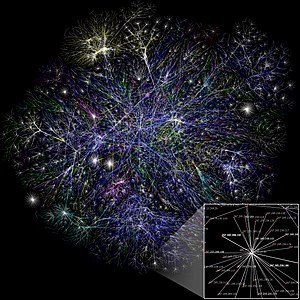 Image via WikipediaI am returning to a project I had started earlier, before semester intervened, and that is the close reading of The Handbook of Emergent Technologies in Social Research (2011, Oxford University Press) edited by Sharlene Nagy Hesse-Biber. Yes, I am still working on the first section: Emergent Technologies in a Broad Social Research Context.
Image via WikipediaI am returning to a project I had started earlier, before semester intervened, and that is the close reading of The Handbook of Emergent Technologies in Social Research (2011, Oxford University Press) edited by Sharlene Nagy Hesse-Biber. Yes, I am still working on the first section: Emergent Technologies in a Broad Social Research Context. This morning I re-read David J. Gunkel's article: "To Tell the Truth: The Internet and Emergent Epistemological Challenges in Social Research" (47-64). Gunkel, who is at Northern Illinois University in the Department of Communication, has written a trim little essay that struggles with "truthiness" (an emergent Internet term he introduces us to in the beginning of the piece) as it is raised by the Internet and our new virtual lives.
Gunkel is clearly a skilled teacher, as demonstrated by the careful way he introduces problems for us to chew on--from our day-to-day life (TV shows, Internet episodes) in juxtaposition to the classical stories or problems raised by philosophers (Plato's Cave; Heidegger's example of a statement about a picture being askew). As I read, I felt myelf weaving thoughtfully back and forth between the worlds of popular and intellectual thought, and this is the hallmark of the best philosophical writing.
He opens with the problems of truth that the Internet has raised for us--what, for instance, makes Wikipedia truthful? If it is open to be edited by anyone how/why, should we believe it as a source of truth? The essay lays the foundation for considering this issue through returning to "the correspondence theory of truth" that Gunkel contends underlies all Western thinking. Simply stated: "the accuracy of an assertion to the thing about which the assertion is made" (50).
What follows is the proverbial opening of the can of worms: There are serious problems, Gunkel states, with the correspondence theory of truth. It doesn't account, for example, for theories that are developed and used as truths before we can actually verify them with a comparison to the real (string theory in physics). Nor does it account for the fact that many things we think are verified by the correspondence theory are actually a maze of reports on reports of the thing...not the actual comparison to the real again (Plato's cave is raised here and reference to the problem of identity cross-dressing on the internet).
He presents two possible alternatives to the limitations of the correspondence of truth: pragmatism and Heidegger's notion of "unhiddenness". Pragmatism brings to the table the honoring of the process by which knowledge is created, and a recognition of "mental abstractions and other things" (p. 56...a la William James) as critical elements of truth. Heidegger's concerns with "unhiddenness" also help to account for the value of ideas, theories, and descriptions that describe a thing, and through that description, create the meaning we attribute to it--or the truth by which it is seen and known. Both of these perspectives are grounded in the social, cultural, intellectual contexts in which we are placed and the thing we wish to know is placed.
In concluding, Gunkel's resolution to this issue of truth and the internet (and indeed the larger issue of truth as social scientists confront it in the digital age) is that researchers must become explicity reflective about the process of knowing.
It is a method of research that makes its own protocols and procedures an object of its consideration...it continually conceptualizes the place from which one professes to know anything and submits to investigation the particular position that is occupied by any epistemological claim whatsoever (62)


